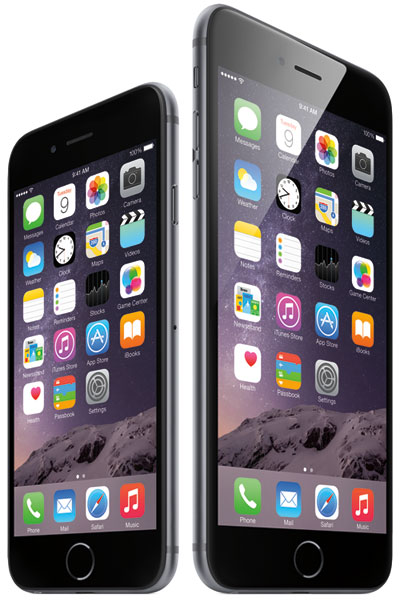With every new iPhone release, Apple delivers a handful of new iPhones to a select few industry journalists to review. How are those journalists and publications selected? First, they are known to appreciate the Apple aesthetic — they have written dozens of positive reviews. No Apple haters allowed, which makes sense. It’s important to set the stage for positive vibes when launching a new product — a professional marketing launch with billions of dollars on the line is never organic.
The reviewers also are under pressure to get their reviews written and out the door in a quick time frame — about a week or less — and they know there will be some high-powered competition as their review hits the Web. The challenge is to cover the bases and make some sort of opinionated statement — but be careful with the negativity, because if you piss off Apple, you won’t get future new Apple products ahead of time. You’ll have to order them just like everyone else.
(Oh what a fall from grace that would be!)
So what we get are staid reviews. Except, what happens when you read between the lines? What happens when you try to ascertain tone? Impressions?
Well, I read through all the reviews I could find. My take?
It’s not good, but on the surface it sounds good. To me, it goes something like this:
The iPhone 6 and iPhone 6 Plus are bigger phones than their predecessors, and now they have screen sizes comparable to bigger Android and Windows phones. The iPhone 6 is finely crafted. The iPhone 6 Plus seems really big. Bigger-er. The screens are sharp and pretty. The camera takes great photos. They are thinner and have acceptable battery life. iOS 8 is great. The iPhone 6 and iPhone 6 Plus are now the best smartphones available. OK, moving on. What’s the next gadget I have to review today?
‘It’s Just Excellent’
While all the reviews are overwhelmingly positive, what I’m not feeling is the delight. Where’s the hyperbole from someone who actually cares? Where’s the cadence of a voice that conveys real enthusiasm for getting to play with Apple’s latest gadget?
Generally, I’m not seeing it. And that sucks.
Is it because there is no new Siri to try? Because there is no new Touch ID to try out? Nothing to play with? Maybe.
David Pierce, reviewing for The Verge, nailed it, multiple times, in slightly different ways. His review reads as if he’s casting about for something accurate but failing to come up with any sort of emotional response to the iPhone 6 or 6 Plus:
“The iPhone 6 is not terribly exciting, or groundbreaking. It’s just excellent,” he wrote.
“The iPhone 6 is utterly without obvious problems or drawbacks — it’s going to be a huge hit. I’m going to buy one,” he wrote.
“Everything is better and nothing is different,” he wrote.
“For a variety of reasons, from the camera to the app ecosystem to the hardware itself, the iPhone 6 is one of the best smartphones on the market. Maybe even the best. But it’s still an iPhone. The same thing Apple’s been making for seven years. A fantastically good iPhone, but an iPhone through and through,” he wrote.
Woohoo.
The trouble is, had Apple graced me with an early iPhone 6 to test, I might have written this same emotionless review. Or went the David Pogue route. Pogue, who’s now at Yahoo, used to write for The New York Times and is a huge personality in the tech world. He just couldn’t seem to get hot or bothered.
‘Worthy Heirs’
To launch his review, he started with a clickable, tweetable headline, “Reviewed: The iPhone 6 Is a Thin, Sexy Phone with a Killer Camera.”
So far so good. Then he undermined the headline by saying all the fuss was just about a phone, and that phone was a symbol of your cultish phone religion, and the enemies of Apple were just waiting for the company to fumble.
“Well, this time, Apple hasn’t fumbled. Its two new iPhones are excellent. Beautiful. State of the art. Worthy heirs to the iPhone throne,” he wrote.
True enough. But what’s missing? Delight. I sense in him no delight for the iPhone 6 — no joy, surprise or pleasure in his review. So why? He tells us — either on purpose or by way of an unconscious apology for his inability to care much, one way or the other, phone cults be damned:
“There’s nothing actually surprising about the iPhone 6 and iPhone 6 Plus. Partly that’s because in the post-Jobs era, Apple isn’t as good at suppressing pre-announcement leaks. And partly it’s because there’s nothing much surprising about any phones these days. They’re mature. These days, designing a phone is a matter of nips and tucks and playing catch-up and one-up — as attractively as possible,” he wrote.
Sheesh. By this point, I’m starting to think Apple might have been better off dropping off a box of iPhones at a retirement community and bringing in a bus full of schoolchildren to teach the old folks how to use the iPhones, filming their reactions, and buying ads everywhere to show them off. At the very least, we would have seen some delight.
Pogue’s review ends with a screed on the Android-vs.-Apple religious war and a lecture about how phones are deeply personal.
“You never want to think your phone is inferior, because then you might feel inferior,” he wrote, basically telling us to judge the entirely excellent iOS ecosystem while also judging the equally excellent Android ecosystem, and observing that competition will slowly make future phones better and better.
What about Pogue’s jaunty video with all the larger-than-life “big” things in it? Pogue’s review includes a video review that makes fun of the bigger iPhones by using props like a giant red cup, giant paperclip, giant sheath of paper, and giant lollipop — but as I near as I could tell, the only delight came from delivering the ongoing visual gags. The iPhone 6 and 6 Plus just happened to be the phones he was reviewing.
In other words, folks, the damn iPhone 6 is now bigger and excellent, so buy it if you want, or if you don’t want to buy it, that’s OK, too. What’s next for me to review again?
The sad thing is, I might also have written this lackluster review (and would not have bothered with the video). The review is absolutely long and comprehensive. Covers all the bases. Takes a shot at the silly Android-Apple fanboy stupidity.
‘I Wish…’
The Wall Street Journal’s Geoffrey A. Fowler basically had a similar response, noting that the iPhone 6 was Apple’s Cure for Android Envy. Fowler, however, seemed a little more willing to imply that he wasn’t particularly impressed with the standard battery life, and he still envied the Galaxy S5’s waterproofing.
“I wish Apple had designed a slightly thicker phone to stave off the battery blues that afflict so many iPhone owners,” he had the guts to note. “Will I eventually have to put a chunky battery case around this lithe beauty?”
Yes, Mr. Fowler. Yes, you will.
The real problem is, Apple seems to have delivered a really good iPhone upgrade. Great. When it comes to the smartphone industry, though, the iPhone 6 seems to imply that our so very personal smartphones simply have evolved into everyday appliances that we happen to carry around. And we sort of just want them to be a little bit better here and there, so we no longer really care all that much, despite the reviewers invoking to the so-called smartphone “cults.”
Is the age of the inspiring smartphone over?
I hope not.























































I just found and read "The iPhone 6 (And 6 Plus) Go To Disneyland" by Matthew Panzarino at TechCrunch. This is the best review I’ve seen yet, by far — it just doesn’t claim that smartphones are "personal," it puts the new iPhones to use in a personal way, and he’s not afraid to share his experience. He still hedges his bets against angering Android fans, but it’s clear that his enthusiasm isn’t technology for technology’s sake — it’s for what the new iPhones were able to bring to his life experience. Great stuff for an early review: http://techcrunch.com/2014/09/17/life-is-tough/